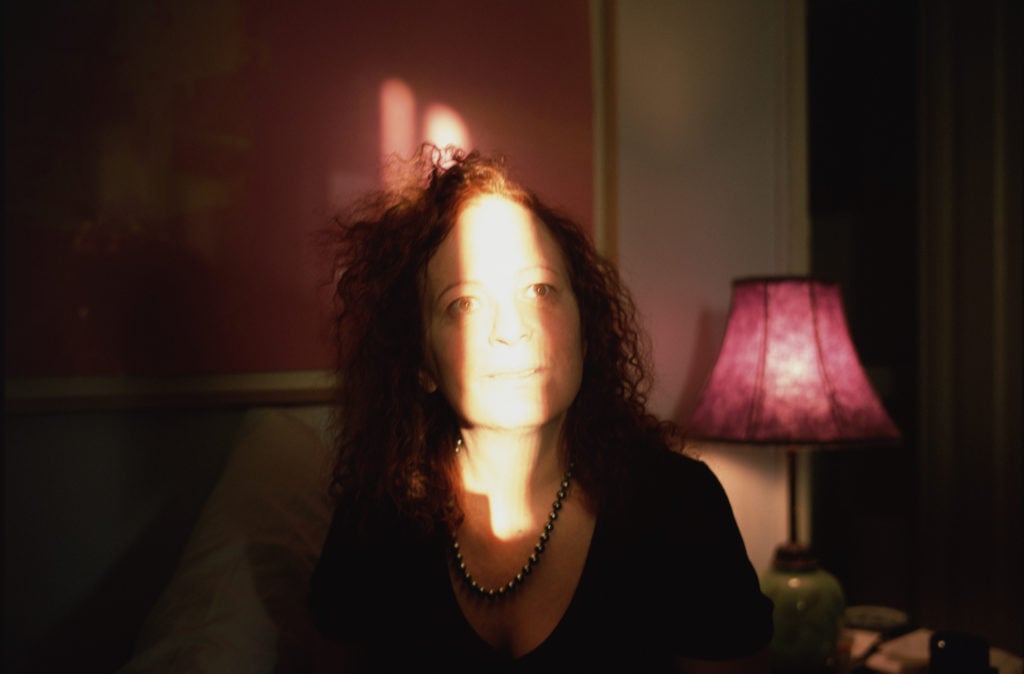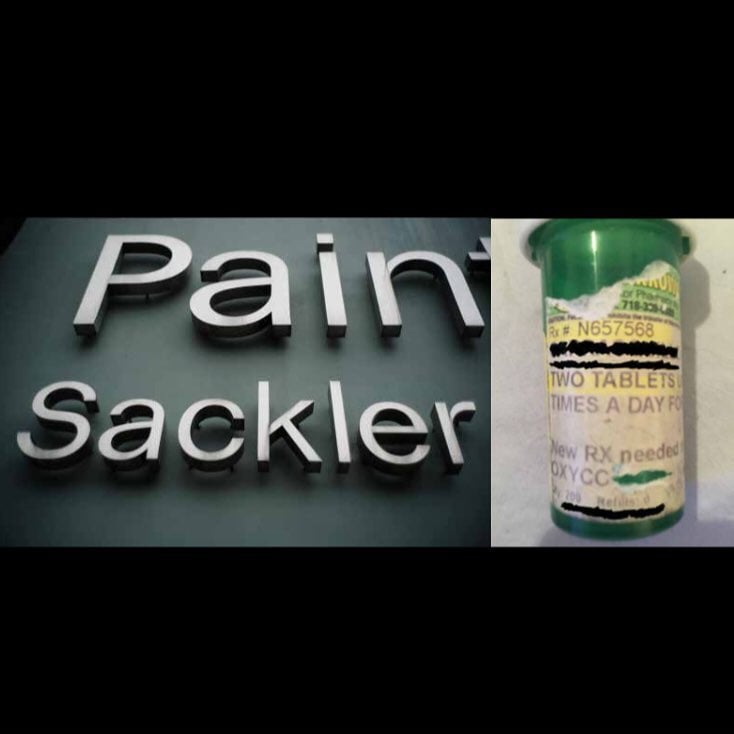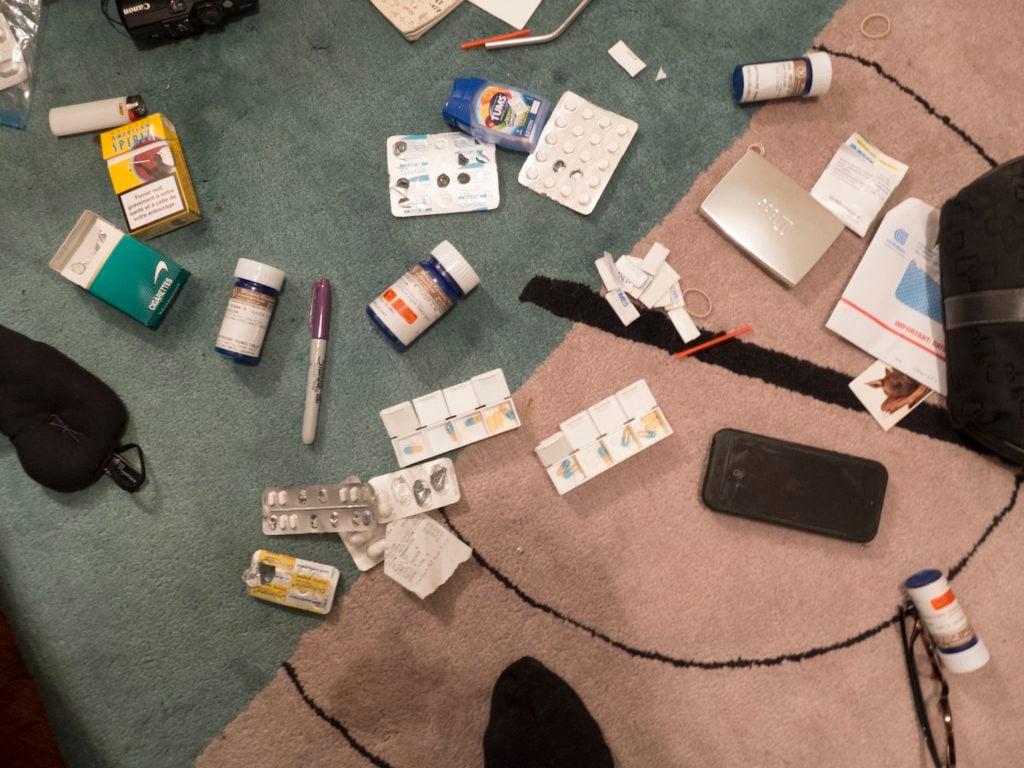Politics
Here’s How Nan Goldin Plans to Hold the Sackler Family Accountable for the Opioid Crisis
Until they fund the nation's opioid recovery, Goldin wants museums to refuse Sackler family donations.

Until they fund the nation's opioid recovery, Goldin wants museums to refuse Sackler family donations.

Sarah Cascone

After spending the past year in treatment for her addiction to OxyContin, the photographer Nan Goldin is launching a campaign targeting the Sacklers, the family of art philanthropists who have quietly made billions from the drug’s sales.
Goldin’s new organization, Prescription Addiction Intervention Now (P.A.I.N.), wants to hold the Sacklers accountable for their role in the opioid crisis as the owners of Purdue Pharma. The family has obfuscated its relationship with the company, which manufactures OxyContin, in the past.

Nan Goldin, Pain/Sackler, Royal College of Art, London (2017) and Oxy Script (2017). Photo courtesy Nan Goldin/Artforum, 2017.
“We demand an immediate response to this epidemic which is growing out of control,” said Goldin and P.A.I.N. in a statement emailed to artnet News. “We are demanding [the Sacklers] fund various treatment models; rehab centers, medication assisted programs, harm reduction, relapse prevention, and holistic approaches. We demand they introduce effective labeling of their products and their addiction potential.”
P.A.I.N. is also calling on museums and universities to refuse future donations from the Sacklers, and plans to launch a petition, hold public actions, and build a robust social media presence to correct misinformation about opioids. The group’s Instagram account (@sacklerpain) will share photographs and videos “illustrating the impact of the crisis on individuals, families, and communities.”

Nan Goldin, Dope on My Rug, New York (2016). Photo courtesy Nan Goldin/Artforum, 2017.
In an essay for the January issue of Artforum, Goldin wrote about her struggles with the drug—she has been clean for about a year—admitting that when she finally sought help, she realized how many others were in her position.
Read the full statement from Goldin and P.A.I.N. below:
We want to get information to, and support from activists, artists, educators, doctors, people in recovery from addiction, and those who are still addicted.
Our primary demands are for the Sackler family and Purdue Pharma to move their money into treatment and education. We are demanding they fund various treatment models; rehab centers, medication assisted programs, harm reduction, relapse prevention, and holistic approaches. We demand they introduce effective labelling of their products and their addiction potential. We demand that they impress upon doctors to stop over-prescribing these medications except for patients who are in extreme pain. We demand they set up educational programs for educators, families, and addicts. We demand they install dispensers on every corner in America with Narcan, the medicine that saves people who are over-dosing. We demand Purdue Pharma advertise the dangers of their products as aggressively as they sold it to the public. We demand an immediate response to this epidemic which is growing out of control.
We intend to photograph and film the impact of the crisis on individuals, families and communities. We as a group intend to put pressure on the Sacklers through a petition. We intend to correct the misinformation regarding opioids through social media and other platforms. We intend to organize public actions. All of this is intended to hold the Sacklers accountable, and put social and political pressure on them.
We are asking museums, art spaces, and educational institutions to refuse future donations.
To the best of our knowledge the only institution that has rejected donations from the Sacklers has been the Globe Theatre in London.
This is the time others do the same.
There is no time to waste.
In response to inquiry from artnet News, Purdue Pharma’s executive director of communications said that the company “would welcome an opportunity to sit down with Ms. Goldin and discuss her ideas,” and provided the following statement:
We are deeply troubled by the prescription and illicit opioid abuse crisis, and we are dedicated to being part of the solution. For more than 15 years, this company has a strong track record of addressing prescription drug abuse which includes collaborating with law enforcement, funding state prescription drug monitoring programs and enhancing interoperability, and supporting drug take back programs. In addition, we’ve recently announced educational initiatives aimed at teenagers warning of the dangers of opioids and continue to fund grants to law enforcement to help with accessing naloxone.